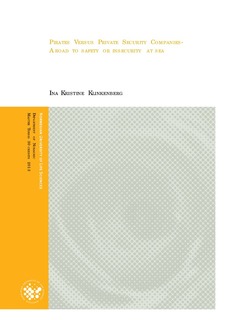| dc.contributor.author | Klinkenberg, Ina Kristine | |
| dc.date.accessioned | 2014-02-13T12:04:33Z | |
| dc.date.available | 2014-02-13T12:04:33Z | |
| dc.date.copyright | 2013 | |
| dc.date.issued | 2014-02-13 | |
| dc.identifier.uri | http://hdl.handle.net/11250/187971 | |
| dc.description.abstract | This thesis examines the regulations governing Private Security Companies (PSC) in the anti-piracy fight. With pirates originating from Somalia expanding their operational field to cover an immense area reaching over the Indian Ocean, Gulf of Aden and into the Arabian Sea, PSCs has become an important deterrent actor safeguarding vessels in pirate prone areas. With PSCs being a relatively new actor within the modern day anti-piracy fight, the thesis seeks to get an understanding of the new legal field surrounding their presence. The significant of studying PSCs in the anti-piracy fight is rooted in the current lack of substantive and systematic information embracing their presence. The result is a knowledge gap which needs to be addressed. The aim of this thesis is therefore to contribute to the understanding of how PSCs are regulated by examining the relationship between the operational field of PSCs and the regulations governing their actions. In order to bridge an understanding of the relationship between PSCs and their regulations, the principal agent-theory has been applied. Drawing on insights from the principal-agent theory helps highlight regulative aspects demonstrating an effective relationship between PSCs and the regulations governing their actions. As the findings reveal, there are currently weaknesses within the regulations governance over PSCs. One factor is rooted in the current knowledge gap as one can argue that regulations have fallen victim of being made without fundamentally grasping the sector they intend to regulate. This has resulted in the emergence of unforeseen situations, such as the rise of floating armouries. Without any overriding international law governing PSCs presence within the anti-piracy fight the field consists of a complex system of regulations creating ambiguity within the field. The ambiguity is rooted in a lack of harmonization, weak wording, insufficient monitoring mechanisms, inconsistency within and between regulations as well as regulations obstructing the efficiency of PSCs mandates. With piracy being an international problem, the regulations governing PSCs should be dealt with accordingly. An international agreement can help solve the complexity hampering the current regulative field governing PSCs. Another solution can be to get in place a vetting system where third parties are introduced to the field in order to quality check that the regulations put forward are withheld. Hence, states can do a much better job in mitigating the flaws within the current regulations in order to secure a high professionalism of PSCs forthcoming presence within the field. | no_NO |
| dc.language.iso | eng | no_NO |
| dc.publisher | Norwegian University of Life Sciences, Ås | |
| dc.subject | Private security companies | no_NO |
| dc.title | Pirates versus private security companies : a road to safety or insecurity a sea | no_NO |
| dc.type | Master thesis | no_NO |
| dc.subject.nsi | VDP::Social science: 200::Criminology: 350 | no_NO |
| dc.subject.nsi | VDP::Social science: 200::Law: 340::International law: 344 | no_NO |
| dc.source.pagenumber | 122 | no_NO |
